Support strong Canadian climate journalism for 2025
Rape, shootings, beatings, burnings — there are very few forms of violence that have not been recorded at the North Mara gold mine in Tanzania since a Canadian mining giant, Barrick Gold, acquired it in 2006. The lucrative site, which has produced more than two million ounces of gold to date, is operated by Barrick’s African subsidiary, Acacia Mining. But the Toronto-based industry titan owns 64 per cent of it.
According to mining watchdogs, that’s more than enough for Barrick — the largest gold producer in the world — to own up to the atrocities that have taken place there. Earlier this year, a Tanzanian government inquiry learned that 65 people have been killed and 270 have been injured at the hands of North Mara mine security since 2006.
And this isn't the only hot spot for a Canadian-owned mine. There are dozens of cases of a Canadian mining company being at the heart of a conflict — one out of every three incidents around the world, according to a report that was commissioned by an industry association in 2009 It's a situation that Prime Minister Justin Trudeau's Liberals promised to address in the 2015 election campaign.
Watchdogs criticize corporate side-stepping
Last month, Barrick Gold published a statement addressing the evidence at the North Mara mine and said it was “deeply troubled by any violence at or around its mining operations, and at those of its affiliates.” When asked by National Observer however, what responsibility it assumed for preventing future violence at the mine, it redirected the bulk of questions to Acacia Mining, headquartered in London, and sent a link to the week-old statement.
“Barrick does not operate the North Mara mine,” said Andy Lloyd, its senior vice-president of communications, in an email. “It is owned and operated by Acacia Mining, a UK based company in which we hold a 64 per cent equity stake, so some of your questions are more appropriately addressed by Acacia.”
In follow-up emails, he later clarified that Barrick’s role as the majority stakeholder is to “offer support and guidance, and to review progress on key initiatives of the company,” and follow up on human rights concerns with Acacia’s management to ensure they are addressed appropriately.
Outrage about violence has prompted calls for the creation of a human rights ombudsman for Canada’s international extractive sector. The goal would be to require greater accountability for companies with violations abroad. The Liberal Party promised to create an ombudsman during the campaign in 2015, but one year later — as environmental and human rights violations continue at Canadian mines in some places — industry watchdogs say they are tired of waiting.
And when National Observer checked in on the status of that promise, Prime Minister Trudeau's office and spokespeople for two of his cabinet ministers declined to confirm that the commitment had been made in the first place.
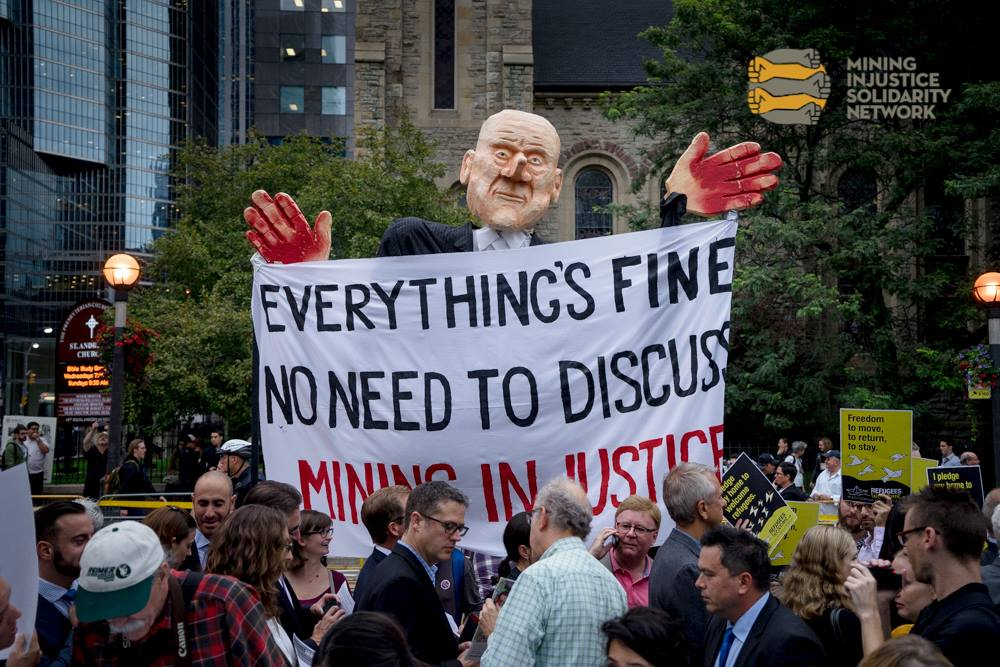
Where is Trudeau’s ombudsman?
“The Government of Canada is assessing Canada’s Corporate Social Responsibility (CSR) approach and identifying ways to strengthen it, ensuring that we continue to demonstrate real leadership around the world on CSR,” reads an October email statement from Global Affairs Canada to National Observer.
“The government's comment still stands,” reads a second from Alex Lawrence, press secretary for Canada’s international trade minister, when asked for followup on the email from Global Affairs.
Both statements were in response to a request to confirm Trudeau’s September 2015 commitment to set up “an independent ombudsman office to advise Canadian (mining) companies, consider complaints made against them, and investigate those complaints where it is deemed warranted,” but stickhandled the question by focusing on the enhanced CSR strategy for Canadian mining abroad adopted by the Harper government in 2014.
Trudeau's office did not respond to the request at all.
And while the enhanced CSR strategy has two main mediation mechanisms — a CSR councillor and national contact point — critics have said the program is wildly ineffective. Industry participation in the program is voluntary, complaints filed are rarely made public, it does not assess if standards are breached or harm is caused, it is not independent from the federal government, and it doesn't have the investigative or advisory powers that an ombudsman would.
A recent OECD (Organisation for Economic Co-operation and Development) Watch study even found that of 250 community complaints made to national contact points around the world over 15 years, none from Canada led to actual improvement in the conditions for victims of corporate abuse, and Canada’s CSR councillor had achieved even less. The Trudeau government was equally silent around the CSR program however, and federal global affairs officials did not respond to requests for more information on how it felt the strategy could be strengthened or whether it has been effective in the past.
Silence is “surprising”
“That does surprise me,” said Liberal MP and mining accountability advocate John McKay, of the collective Parliamentary silence on the ombudsman promise. “I think (the commitment) is pretty clear in the Liberal Party’s documentation.”
Twice, McKay’s bills to promote environmental best practices and the protection of international human rights standards at Canadian operations abroad fell flat in the House of Commons, but with the recent election of a Liberal government, he said he’s received promising signs that his legislation will be given new life.
In an interview, he supported the creation of an ombudsman to oversee the industry, and said that discussion is “live” within the federal government, but takes time to deliver in a thorough manner that could not be dismantled easily by the legal teams of opposing mining corporations. The scope, powers, and mandate of such an ombudsman have yet to be determined, he said, but he didn’t doubt the strength of his party’s commitment, despite an apparent unwillingness to talk about it at the ministerial level.
“The ultimate benefit for us is clear branding and clear responsiveness to indiscretions, violations or alleged violations by mining companies,” McKay explained. “If you don’t actually have a policeman to enforce anything then it’s sort of like travelling on the 401 (highway) and saying, ‘Well of course I’ll obey the speed limit officer.’ You need somebody whose going to lay down the heavy hand.”
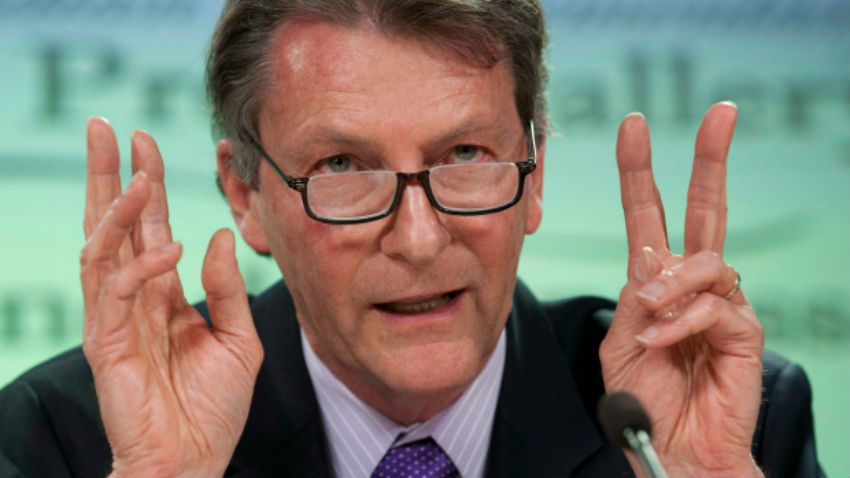
Cracking down on Barrick Gold
While there’s no clear start date for Canada’s extractive sector ombudsman, local governments around the world have been using their own judicial power to hold companies to account for violations at Canadian mines in their respective countries.
Barrick Gold, for example, was slammed with a US$9.3-million fine earlier this year for a cyanide spill at its Veladero mine in Argentina, and two years prior to that, was hit with a record US$16.4-million penalty in Chile, where it was found guilty of 23 violations of its environmental impact agreement at the Pascua Lama gold project on the Chile-Argentine border. The company is currently facing a U.S. class action lawsuit accusing it of distorting facts related to the stalled Pascua Lama mine project, and only this month was it able to resume operations at its Veladero mine, where Argentinean authorities ordered its closure after a second leak of cyanide solution.
In 2015, a New Zealand engineer also tried to the sue the company when he was fired after bringing up health, safety, and environmental violations at that same mine, but could not be reached for an update on his lawsuit. Barrick Gold would not comment on “individual personal matters,” but said in an email that it’s code of business conduct includes strong protection for those who raise such concerns.
All in all, a study commissioned by the Prospectors and Developers Association of Canada (PDAC) — an industry association with over 8,000 members around the world — found that Canadian mining companies were at the heart of at least 55 mining-related social conflicts between 1999 and 2009, and both industry and civil society organizations report that globally, mining conflicts are increasing.
Earlier this month, three refugees launched a lawsuit against the Vancouver-based Nevsun Resources for allegedly using slave labour at the Bisha gold mine in Eritrea.
Overall, the report identified 171 incidents in total for companies worldwide with Canadian-owned operations most likely to be the source of problems.
"The statistics demonstrate that Canadian companies have been the most significant group involved in unfortunate incidents in the developing world," the report said. "Canadian companies have played a much more major role than their peers from Australia, the United Kingdom and the United States. Canadian companies are more likely to be engaged in community conflict, environmental and unethical behaviour, and are less likely to be involved in incidents related to occupational concerns."
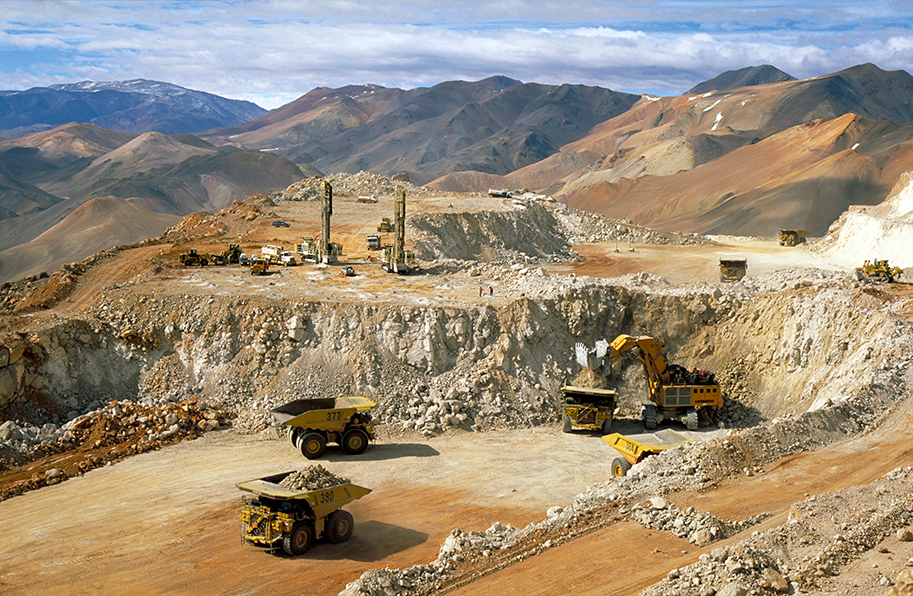
“Walking wounded” at North Mara mine
Yet despite the best efforts of victims and their governments, Catherine Coumans, a research co-ordinator from MiningWatch Canada, said the horror stories continue at Barrick operations in Africa and South America. The company has been criticized by Amnesty International and Human Rights Watch over the grave abuse of Indigenous populations and communities at its gold mines in Papua New Guinea, including home burnings, gang rapes and violent raids, and at the North Mara mine in northwestern Tanzania, Coumans has personally witnessed a lot of “walking wounded.”
“There’s still an awful lot of very, very serious beatings and assaults going on,” she told National Observer. “And these are targeted at people’s joints, their ankles and knees, so they lead to very long-lasting, debilitating injuries, and people’s heads as well, so there are neurological injuries.”
Coumans has visited the North Mara mine in northwestern Tanzania annually since 2014, and in partnership with the U.K.'s Rights and Accountability in Development (RAID), has interviewed roughly 100 victims of violence at the hands of contracted mine security. Most of the victims are displaced villagers who scavenge for the low-grade ore discarded in the company’s waste rock piles, or innocent bystanders caught in the cross-fire.
Mine security and local police, she explained, working under a memorandum of understanding with Barrick’s subsidiary, respond violently to these “trespassers,” even though they’re removing metal from the dump. Few survivors ever speak about their ordeal publicly for fear of retribution, she said, but the atrocity was internationally acknowledged at the United Nations Forum on Business and Human Rights in Geneva in December 2014.
Canadians “don’t appreciate it”
“Barrick is aware of this because we’ve been raising this in the public arena for many years, and Barrick is not responding, but pushing this off and saying, ‘Go talk to the subsidiary,’” Coumans criticized. “In this day and age, parent companies have to be held responsible for what their subsidiaries are doing, and in particular when that subsidiary is majority-owned by Barrick.”
While McKay, MP for the Ontario riding of Scarborough-Guildwood MP, would not single out Barrick Gold specifically, he also said Canadian mining companies can do better than to hide behind a "whole variety of corporate veils" that displace their responsibility.
“Canadians don’t appreciate it and I actually think it’s counterproductive in the long run to your desire to be seen as a responsible Canadian corporation,” he explained.
An ombudsman, if created, would not only make policy recommendations to the government that would crack down on indiscretions, but seek to compel the production of vital documents and testimony in order to find facts that could lead to sanctions by making the company ineligible to receive government services, like trade support.
The Mining Association of Canada (MAC) however, which represents 39 of the country's major industry players, opposed the creation of such an officer in an interview with National Observer, and said while the idea may be "laudable in theory," its powers would be too "impractical" and "unworkable."
"The kinds of investigative tools that (advocates) are talking about would require extraterritorial efforts that I don’t think other countries would go along with," said MAC president and CEO Pierre Gratton. "It’s extending the reach of Canada into other countries that we would never tolerate if other countries tried to do here."
Barrick Gold is a member of the MAC, and despite the Toronto company's extensive record of fines and penalties, Gratton said he is proud of all of the association's members. Over the last year, he said they have played a key role in encouraging countries like Argentina and Finland to adopt its Towards Sustainable Mining (TSM) program, which commits participants to greater accountability through facility assessments, transparency through publicly-available performance reports, and credibility through consultation with an advisory panel.
"There are always, in an association, those that are leaders," said Gratton. "Some lead in some areas but lag in others, and some are leaders in other areas and lag in others, but collectively, I think the industry — and our members — are fully committed to sustainable mining."
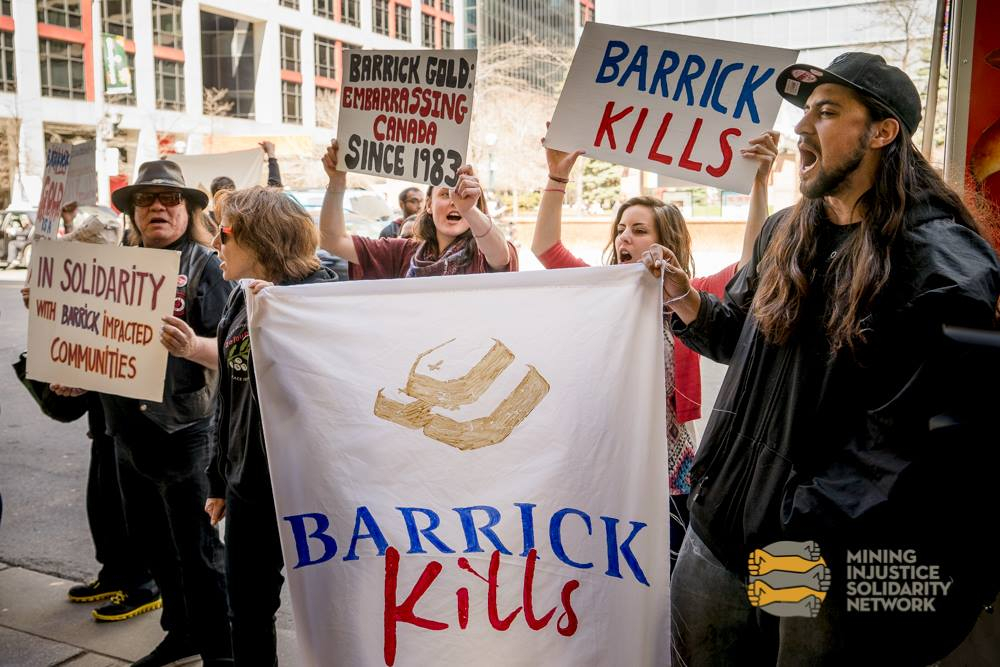
Is Barrick Gold getting better?
Barrick Gold's human rights policy states that it “does not tolerate” human rights violations committed by its employees, affiliates, or any third parties acting on its behalf. The company was one of many that participated in consultations for the creation of the UN’s Guiding Principles of Business and Human Rights, which effectively require a corporation’s “due diligence” to address adverse human rights impacts at the hands of business relationships, like subsidiaries.
Barrick, however, firmly denied allegations that in redirecting questions about the North Mara mine to Acacia Mining, it was off-loading any of its responsibilities as the company reaping the majority of profits from the hotly-contested operation.
“Acacia is a distinct public company with an independent board of directors and management team who are responsible for oversight of the company’s operations,” Lloyd explained. “This is not just a fact but also reflects legal requirements for companies listed on the London Stock Exchange, to ensure controlling shareholders do not exercise undue influence.”
Since 2011, he added, Acacia Mining has invested US$30 million in village benefit agreements near the mine that support alternative livelihoods, access to clean water, hospitals and education. The London-based subsidiary has also supported training in human rights, sexual harassment and use of force practices for local police and community members, and has a partnership with the NGO Search for Common Ground to improve awareness of human rights and provide conflict resolution training in communities.
But according to industry watchdogs, these initiatives aren’t enough, and Acacia Mining’s grievance mechanism at the North Mara mine is “not accessible,” “not equitable,” “not rights compatible,” “not predictable” and “not legitimate.”
No justice for victims, says lawyer
Twelve villagers, whose lives were permanently altered by violence at the North Mara mine, took what many saw as a courageous move in 2013. They sued Acacia Mining (then known as African Barrick Gold) in Britain’s High Court for excessive use of force that had led to death and injury of relatives in 2008.
While Acacia denied all of their accusations, the claimants were successful in blocking the company’s subsidiary from asking a local court to declare that it could be held responsible for actions of the police. Despite the victims’ resolve however, by February 2015, every single one of them had somehow settled out of court with Acacia Mining for an undisclosed sum of cash.
At the time, Leigh Day, the British law firm representing the Tanzanian plaintiffs, chalked it up to a “pre-emptive legal strike by this very powerful company to try and obtain an unfair advantage over our clients,” and in 2014, a Tanzanian environmental lawyer told audiences at the UN Forum on Business and Human Rights that Acacia had actively sought out these victims when it learned it was being sued, and encouraged them to “drop the case” in favour of their grievance program.
“You have to sign a waiver that you’re not going to sue the company or its subsidiary at that particular time or in the future,” said Evans Sichalwe of Tanzania’s Legal and Human Rights Centre. “The question is, if you had this non-judicial mechanism and if you really want to help these people, why wait until they have filed a suit?”
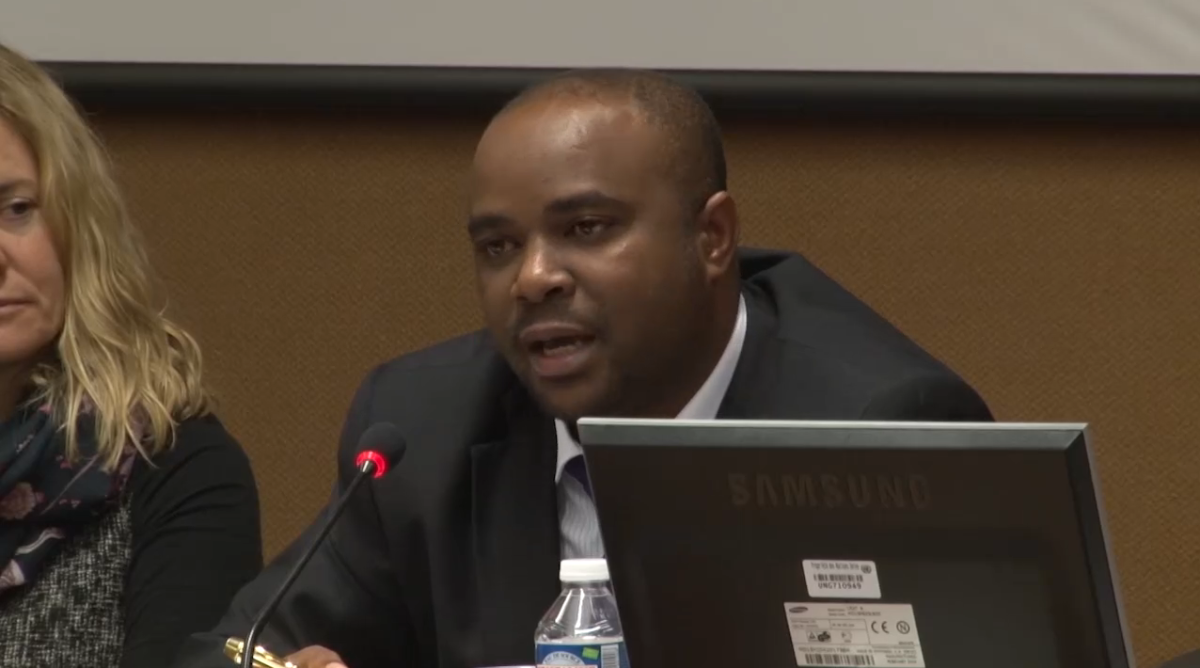
Barrick Gold said it believes Acacia's process is "aligned with international standards," and further disagreed with Sichalwe's claims:
"We do not believe that Acacia offered remediation packages to any claimants who, at the time the remediation was offered, were represented by Leigh Day or any other counsel," Lloyd wrote in an email.
Sichalwe however, also said the grievance program — whose office is located behind a guarded fence — is highly inaccessible to victims, many of whom are illiterate and made to sign papers they don’t understand in the presence of armed guards. He said the process is "not rights-compatible" or "equitable" for those seeking justice over ongoing violence.
“When they do sign, maybe (the officers) say, ‘Oh, we’ll give you TSh20 million for this,’ and within that 20 million they say, 'We are going to pay for your medication if you are injured, we are going to provide, if you have kids, for education, we are going to buy you plots to build you a house,'" he explained. 'TSh' represents the local currency, the Tanzanian Shilling.
“But if you have been injured, the medication it is coming from the same basket, from the same TSh20 million, plus some of them have been told that you can’t get it all in cash. They tell you, 'We’ll buy you cars, or you have to work for two years to get this money and all that.'”
Similar criticisms have been made about Barrick Gold’s remedy program for victims of rape by guards at the Porgera mine in Papua New Guinea, which also requires victims to “sign away their right to legal recourse in return for remedy packages,” according to MiningWatch Canada.
MiningWatch Canada, in conjunction with Above Ground and other members of Canadian Network on Corporate Accountability (CNCA) will send model legislation for the industry ombudsman's office to the Trudeau government on Wednesday. Above Ground's program officer, Geneviève Paul, said she hopes the action spurs policy-makers into action so that companies like Barrick Gold have no choice to accept greater responsibility for stopping violence its operations and those of its subsidiaries.
"Talk is not enough," she told National Observer. "The government’s response so far has been really, really disproportionate with the amount of harm we’re talking about. I think that we needed (an ombudsman) 15 years ago, so we really need it badly now."

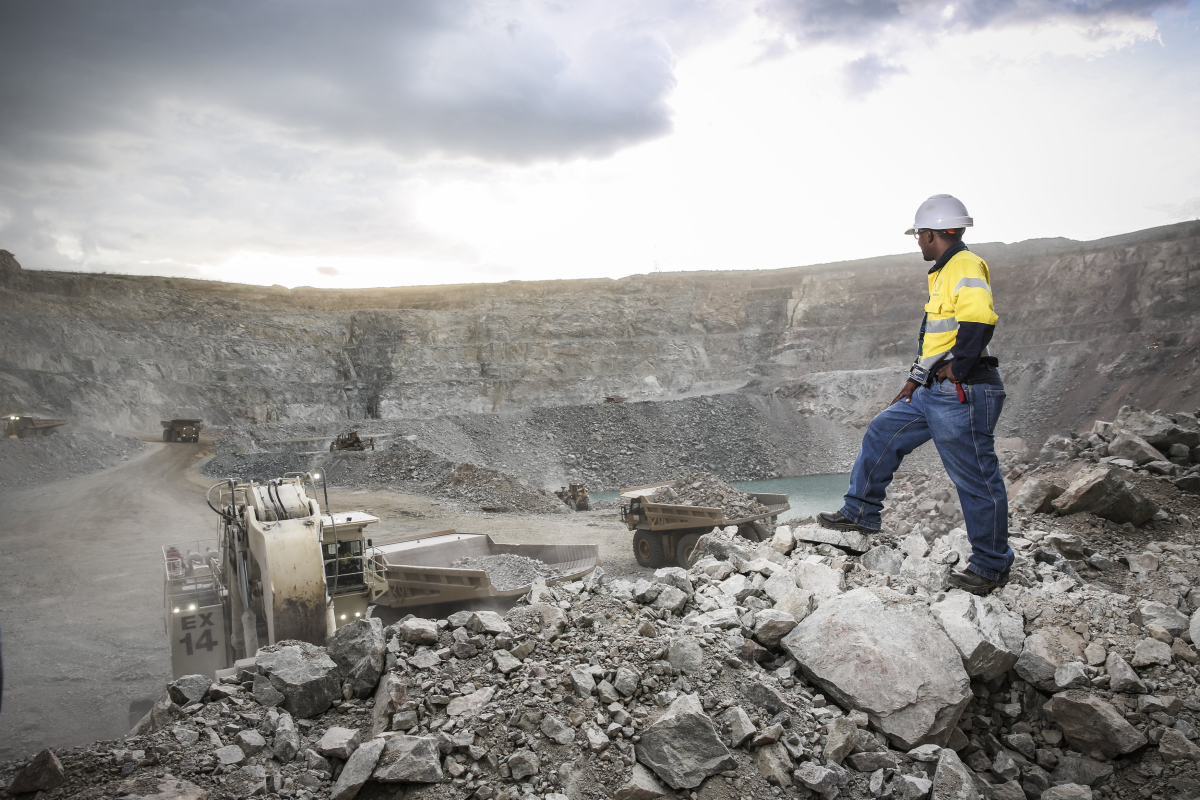

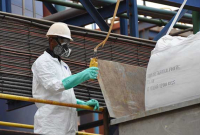
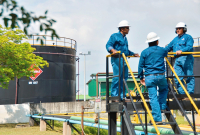
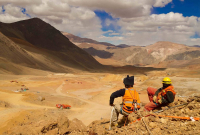
Comments
mfagrlc
http://www.we-sc.se/065-belstaff-vinterjacka-herr.html
http://www.oekopruefzeichen.de/705-peuterey-jacke-mens-hurricane.html
http://www.expoce.nl/779-parajumper-irene.html
http://www.itcgsantagata.it/barbour-shop-online-italia-763.asp
http://www.thamescommunityfoundation.org.uk/831-moncler-ladies-ski-wear…
Barbour Tienda Madrid
Canada Goose Baby Snowsuit
Parajumpers Rea Barn
Belstaff Steve Mcqueen
Moncler Strickjacke Herren